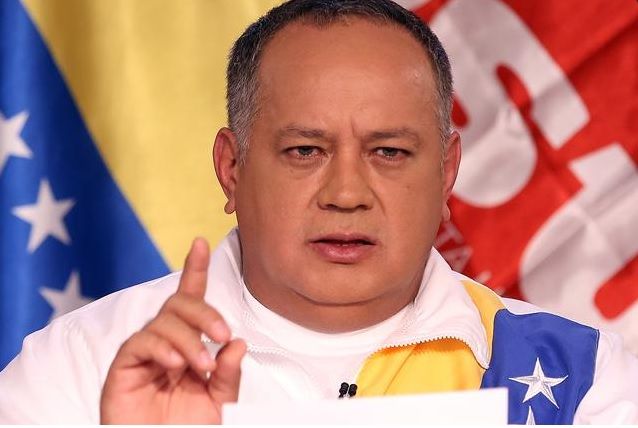By Jose de Cordoba and Juan Forero | Wall Street Journal

The stocky and bull-necked Mr. Cabello, who often sports the standard Chavista uniform of red shirt and tri-color windbreaker in the red, yellow and blue of the Venezuelan flag, is host of a television program, “Hitting With the Sledge Hammer,” on state television, in which he uses telephone intercepts of opponents to attack and embarrass them. Mr. Rodriguez said he believes Mr. Cabello will never make any kind of a deal with the U.S. “Diosdado is a kamikaze,” he said. “He will never surrender.”
U.S. investigators have painstakingly built cases against Venezuelan officials by using information gathered from criminal cases brought in the U.S. In Miami, people familiar with the matter say a key building block in the investigations involved a drug-smuggling ring run by Roberto Mendez Hurtado. A Colombian, Mr. Mendez Hurtado moved cocaine into Apure state in western Venezuela and, according to those familiar with his case, had met with high-ranking Venezuelan officials. The cocaine was then taken by boat or flown directly to islands in the Caribbean before reaching American shores.
Mr. Mendez Hurtado pleaded guilty in Miami federal court and received a 19-year prison term in 2014. People close to that investigation say that Mr. Mendez Hurtado and his fellow traffickers wouldn’t have been able to operate without paying off a string of top military officers and government officials.
“The involvement of top officials in the National Guard and in the government of Venezuela in drug trafficking is very clear,” said a former Venezuelan National Guard officer who served in intelligence and in anti-narcotics and left the country last year frightened by the overwhelming corruption he saw daily.
“Everyone feels pressured,” he said. “Sooner or later everyone surrenders to drug trafficking.”
In another case, in Brooklyn, prosecutors have learned about the intricacies of the drug trade in Venezuela after breaking up a cocaine-smuggling ring led by Luis Frank Tello, who pleaded guilty, court documents show. The cocaine was brought in across the border from Colombia and, with the help of National Guard officers, shipped north, sometimes from the airport in Venezuela’s second-largest city, Maracaibo.
The U.S. investigations of Venezuelan officials have been going on for years, though investigators have sometimes been thwarted by politics.
In 2008, the U.S. Treasury Department put three top aides to then-President Chávez on a blacklist and froze any assets they might have in the U.S. Among the three was Mr. Carvajal, known as “El Pollo,” or the Chicken, then the head of military intelligence. The U.S. acted after extensive evidence surfaced earlier that year in the computers of a dead Colombian guerrilla commander of burgeoning cocaine-for-arms exchanges between the rebels and top Venezuelan generals and officials, according to the U.S. and Colombian governments.
In 2010, Manhattan prosecutors unsealed the indictment of Mr. Makled, the Venezuelan drug dealer accused of shipping tons of cocaine to the U.S. through the country’s main seaport of Puerto Cabello, which he allegedly controlled. Mr. Makled, who had been captured in Colombia, boasted of having 40 Venezuelan generals on his payroll.
“All my business associates are generals,” Mr. Makled said then to an associate in correspondence seen by The Wall Street Journal. “I’m telling you we dispatched 300,000 kilos of coke. I couldn’t have done it without the top of the government.”
DEA agents interviewed Mr. Makled in a Colombian prison as they prepared to extradite him to New York. But instead, Colombia extradited him in 2011 to Venezuela, where he was convicted of drug trafficking. This February, he was sentenced to 14 years and six months in jail.
Last July, American counter-drug officials nearly nabbed Mr. Carvajal, who had been indicted in Miami and New York on drug charges and detained in Aruba at the American government’s behest. But Dutch authorities released him to Venezuela, arguing that he had diplomatic immunity.
Upon Mr. Carvajal’s release, President Maduro praised the former intelligence chief as a dedicated anti-drug fighter who had set a worlds’ record capturing drug capos.
The U.S. is also gathering information from bankers and financiers who handle the money for top Venezuelan officials. Since last year, people familiar with the matter say the U.S. government has revoked the visas of at least 56 Venezuelans, including bankers and financiers whose identities haven’t been made public. Some have sought to cooperate with investigators in order to regain access to the U.S.
“They are flipping all these money brokers,” said a lawyer who is representing two Venezuelan financiers who have had their visas revoked. “The information is coming in very rapidly.”
—Christopher M. Matthews in New York contributed to this article.
Lees hier de PDF
Bron: WallStreetJournal

